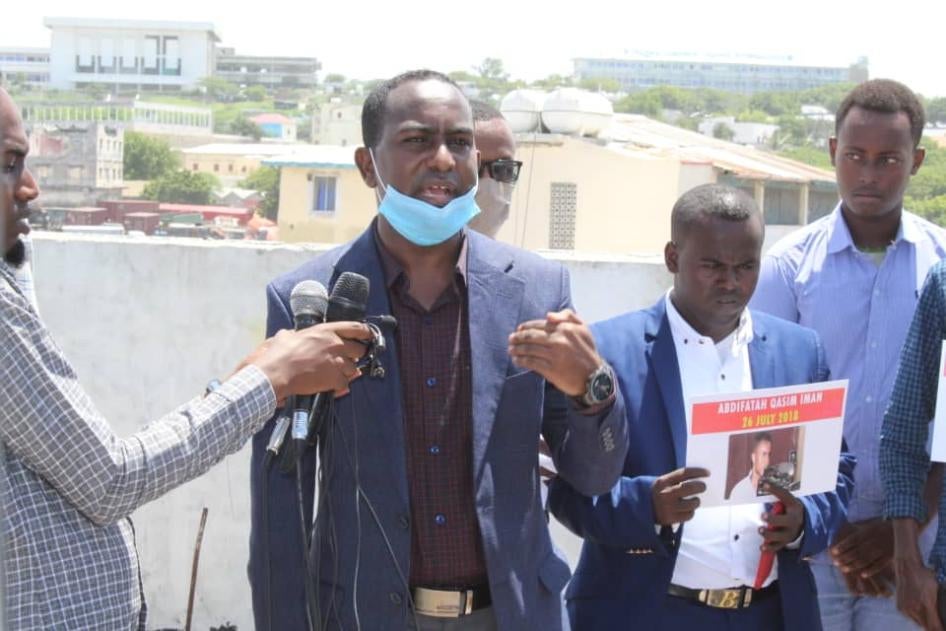(Nairobi) – The Somali authorities should immediately release a prominent journalist and media rights advocate who is being held and investigated on apparently politically motivated allegations. Abdalle Ahmed Mumin has been detained since October 11, 2022, in intelligence and later police custody in Mogadishu, the capital.
Abdalle is the secretary general of the Somali Journalists Syndicate and a veteran freelance reporter. On October 11, in the late afternoon, National Intelligence and Security Agency (NISA) officers arrested him at Aden Adde International Airport, as he prepared to board a flight for Nairobi.
“Locking up a committed media rights advocate such as Abdalle Ahmed Mumin sends a chilling message to all journalists in Somalia,” said Laetitia Bader, Horn of Africa director at Human Rights Watch. “The authorities should immediately release Abdalle and create a safe and open environment for the media.”
On October 8, the Information Ministry released a directive that “prohibited dissemination of extremism ideology messages, both from traditional media broadcasts and social media,” and announced the suspension of “more than 40 social media pages where terrorists have been spreading intimidation, incitement, and wrong messages.” On October 10, the Somali Journalists Syndicate (SJS) and four other media organizations released a statement raising concerns that the directive could restrict legitimate speech and media freedoms.
On the morning of October 11, Abdalle had tweeted CCTV footage reportedly taken outside the SJS’ office in Mogadishu the previous night, showing security forces trying to enter the office.
Abdalle’s lawyer, a relative, and two colleagues told Human Rights Watch they were denied access to Abdalle during his initial detention at Godka Jillaow, one of the main detention facilities run by the intelligence agency.
On October 12, the Information Ministry released a statement that Abdalle was being “held on security related charges,” and that he “has no charges related to his work as a journalist.” The statement called on the prosecutor’s office to provide the evidence for his arrest.
On October 13, Abdalle was transferred to the police Criminal Investigation Department. Later that day, the authorities took him to the Office of the Attorney General, and before the Benadir Regional Court.
During the court hearing, the prosecutors said that they were investigating Abdalle for violating the government’s new directive and publishing “secret” footage. They sought to have him remanded pending investigations. Abdalle’s lawyers asked the prosecutors to clarify the provisions under which he was being investigated, but this information was not provided. The court returned Abdalle to Criminal Investigation Department custody until October 16.
Media freedoms have been a major casualty of Somalia’s long-running armed conflict. During President Hassan Sheikh Mohamud’s previous administration, journalists faced intimidation and violence from both the government and the Islamist armed group Al-Shabab. In Mogadishu, security officials, including NISA, had banned reporting on statements by Al-Shabab, temporarily closed down at least three media outlets, and arbitrarily arrested journalists.
Abdalle had previously received threats and survived an attack in early 2015 following his reporting in the Wall Street Journal on the killing of Al-Shabab’s leader, which forced him to flee the country. Since returning to Mogadishu, Abdalle has been detained twice, notably in October 2021 alongside two other colleagues, while organizing a training session on media freedom in the town of Jowhar.
Security forces have often justified arrests of journalists and shuttering of media outlets on national security grounds. The apparent goal frequently is to silence legitimate reporting on key issues of public concern, Human Rights Watch said.
Since returning to power in May, President Hassan Sheikh has expressed a commitment to key legal reforms. However, the new directive adds to an outdated criminal code that restricts the right to free expression, and has regularly been used to hamper critical reporting. In 2020, the media law was amended and includes vaguely worded provisions on criminal penalties that could give law enforcement authorities a wide scope for misinterpretation and abuse, including prohibiting reporting on issues deemed to conflict with “national interest” and “dissemination of propaganda.”
The Hassan Sheikh administration should take urgent steps to end all harassment and arbitrary arrests of journalists by the intelligence and other security forces, Human Rights Watch said. Somalia’s international partners should press the government to commit to full, open reporting on issues of critical public interest, and amend or repeal laws that restrict the right to freedom of expression and the media.
“The detention of Abdalle Ahmed Mumin raises serious concerns about the new administration’s commitment to media freedom,” Bader said. “The Somali government needs to stop curtailing legitimate news coverage and free speech by making baseless national security claims.”








